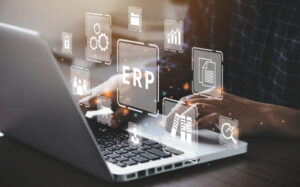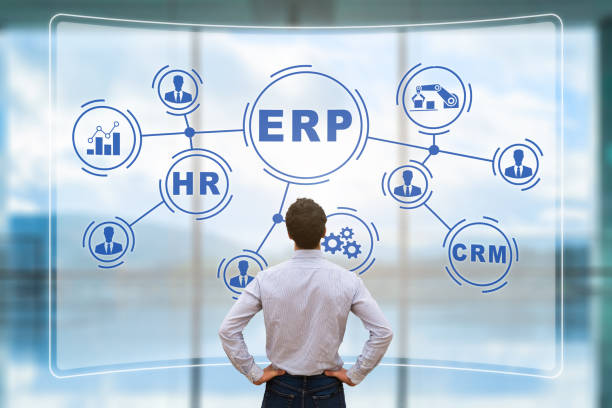Introduction: Why ERP Software Is Vital in 2025
In today’s fast-paced digital economy, businesses face growing pressure to optimize resources, improve visibility, and respond to market demands in real time. Enter Enterprise Resource Planning (ERP) software—an all-in-one solution that integrates core business functions into a unified system.
From supply chain and HR to finance and customer service, ERP software empowers organizations to automate processes, reduce manual tasks, and make data-driven decisions. As of 2025, ERP systems are smarter, cloud-based, and AI-enabled—making them an essential tool for modern enterprises.

What Is ERP Software?
ERP (Enterprise Resource Planning) software is a centralized platform that manages and integrates a company’s key operations. It combines various business processes—such as inventory management, accounting, procurement, human resources, and customer relations—into one system.
Key ERP Modules Include:
- Finance & Accounting
- Human Resources (HR)
- Customer Relationship Management (CRM)
- Supply Chain Management
- Manufacturing & Production
- Project Management
These modules share a common database, enabling seamless communication and real-time insights across departments.
Top ERP Software in 2025
Here are some of the leading ERP solutions that businesses rely on in 2025:
1. SAP S/4HANA – Best for Large Enterprises
- Strengths: Real-time analytics, scalability, powerful automation
- Best For: Multinational corporations, manufacturing, finance
2. Oracle NetSuite – Best Cloud ERP for SMBs
- Strengths: Cloud-native, user-friendly, customizable dashboards
- Best For: Mid-sized companies, eCommerce, services
3. Microsoft Dynamics 365 – Best for Integration
- Strengths: Combines ERP and CRM, tight integration with Microsoft 365
- Best For: Businesses using Windows, Office, Azure
4. Odoo – Best Open-Source ERP
- Strengths: Modular structure, cost-effective, customizable
- Best For: Startups, SMEs needing flexibility
5. Infor CloudSuite – Best for Industry-Specific Solutions
- Strengths: Vertical-specific ERP (manufacturing, healthcare, retail)
- Best For: Companies needing tailored ERP features
Benefits of ERP Software for Businesses
| Benefit | Why It Matters |
|---|---|
| Process Automation | Reduces manual tasks and improves operational efficiency |
| Data Visibility | Real-time insights into business performance and KPIs |
| Cost Reduction | Eliminates redundancy, reduces errors, and improves resource utilization |
| Scalability | Supports business growth with flexible architecture |
| Improved Collaboration | Unifies departments with centralized data and workflows |
| Regulatory Compliance | Built-in tools for audits, reporting, and industry compliance (e.g., SOX, GDPR) |
How ERP Software Works
ERP systems operate on a central database, which allows all departments to access and update information in real time. For example:
- When a sales order is entered, the inventory module updates stock levels.
- The finance module tracks the revenue.
- The logistics module schedules delivery.
This seamless integration reduces errors, enhances accuracy, and ensures all departments are aligned.
ERP Software Use Case: Manufacturing Firm
Company: Titan Tools Inc.
Challenge: Disconnected systems for inventory, finance, and HR leading to delays and costly errors
Solution: Implemented SAP S/4HANA
Results:
- 30% reduction in operational costs
- Real-time inventory management
- 40% faster order fulfillment
Trends in ERP Software for 2025
- Cloud-Based ERP: Cloud adoption continues to rise due to scalability, remote access, and lower upfront costs.
- AI and Machine Learning: Predictive analytics, automated reporting, and smart recommendations are driving better decision-making.
- Mobile ERP: Mobile-friendly ERP systems support on-the-go decision-making and remote workforce management.
- Industry-Specific ERP: Tailored features for healthcare, retail, education, and manufacturing sectors are gaining traction.
- ERP + IoT Integration: Real-time machine data from IoT devices is feeding into ERP for predictive maintenance and optimization.
How to Choose the Right ERP Software
1. Define Business Requirements
- List the processes and departments you want to integrate
- Identify current pain points and inefficiencies
2. Set a Budget
- Consider licensing, implementation, training, and maintenance costs
3. Choose Between Cloud vs. On-Premises
- Cloud ERP: Faster deployment, lower IT costs, remote accessibility
- On-Premises ERP: More control, better for sensitive data
4. Evaluate Vendor Reputation & Support
- Look for proven track records, strong support, and industry expertise
5. Prioritize Scalability & Customization
- Ensure the software can adapt to your future growth and changing needs
ERP Implementation Tips
- Start with a Pilot Program: Test the software with one department before full deployment.
- Train Employees: Ensure teams are adequately trained to minimize downtime.
- Set Realistic Goals: ERP implementation takes time; focus on long-term ROI.
- Work with Experts: Consider ERP consultants for complex rollouts.
SEO Optimization Summary
Primary Keywords: enterprise resource planning software, ERP software 2025, best ERP software
LSI Keywords: cloud ERP, ERP implementation, ERP for small businesses, SAP ERP, NetSuite
Suggested Internal Links:
- “Cloud vs On-Prem ERP: Which Is Better for Your Business?”
- “Top CRM Software Tools for 2025”
Suggested External Links: - SAP S/4HANA
- Oracle NetSuite
- Microsoft Dynamics 365
- Odoo
- Infor CloudSuite
Conclusion
ERP software is the digital backbone of modern enterprises in 2025. It enhances visibility, automates workflows, and empowers decision-makers with real-time data. Whether you’re a startup needing agility or a global brand managing complex operations, investing in the right ERP solution can redefine how you do business.
Choose wisely, plan strategically, and let ERP drive your business into the future.
